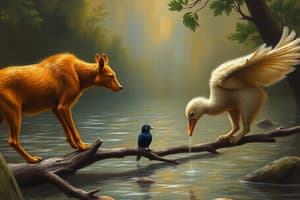Podcast
Questions and Answers
What is zoology?
What is zoology?
Zoology is the scientific study of animals, including their biology, behavior, ecology, and evolution.
Name and define one branch of zoology.
Name and define one branch of zoology.
Entomology is the study of insects.
What is taxonomy?
What is taxonomy?
Taxonomy is the classification of animals into hierarchical categories.
How does evolution explain the origin of species?
How does evolution explain the origin of species?
What is the significance of conservation in zoology?
What is the significance of conservation in zoology?
What are field studies in zoology?
What are field studies in zoology?
Name one historical figure relevant to zoology and their contribution.
Name one historical figure relevant to zoology and their contribution.
What modern trend is increasingly important in zoology?
What modern trend is increasingly important in zoology?
Flashcards are hidden until you start studying
Study Notes
Definition and Scope
- Zoology: The scientific study of animals, including their biology, behavior, ecology, and evolution.
- Branches of Zoology:
- Entomology: Study of insects.
- Ichthyology: Study of fish.
- Ornithology: Study of birds.
- Mammalogy: Study of mammals.
- Herpetology: Study of reptiles and amphibians.
- Ethology: Study of animal behavior.
Key Concepts
- Taxonomy: Classification of animals into hierarchical categories (domain, kingdom, phylum, class, order, family, genus, species).
- Anatomy: Study of the structure of animals, focusing on organs and systems.
- Physiology: Study of the mechanical, physical, and biochemical functions of animals.
- Evolution: Understanding the origin of species through mechanisms like natural selection and genetic drift.
- Ecology: Study of animal interactions with each other and their environments.
Important Topics
- Animal Diversity: Exploration of various animal forms, habitats, and adaptations.
- Reproduction: Different modes (sexual and asexual), life cycles, and developmental stages (embryonic development).
- Behavior: Innate vs. learned behaviors, social structures, communication methods, and mating rituals.
- Conservation: Importance of preserving biodiversity and addressing threats like habitat loss, pollution, and climate change.
Research Techniques
- Field Studies: Observing animals in their natural habitats to gather data on behavior, ecology, and population dynamics.
- Laboratory Experiments: Controlled experiments to study physiology, genetics, and development.
- Molecular Techniques: DNA sequencing and genetic analysis to understand evolutionary relationships and species identification.
Applications of Zoology
- Biodiversity Conservation: Developing strategies for the protection of endangered species and ecosystems.
- Biomedical Research: Understanding animal models to advance human health.
- Agriculture: Improving livestock health and productivity through better animal management practices.
Historical Figures
- Aristotle: Early classification of animals and observations of behavior.
- Charles Darwin: Theory of evolution by natural selection.
- Gregor Mendel: Principles of inheritance that apply to animal genetics.
Modern Trends
- Increased focus on animal welfare, ethics in research, and the impact of climate change on animal populations.
- Use of technology (e.g., GPS tracking, bioacoustics) for studying and monitoring wildlife.
Definition and Scope
- Zoology encompasses the scientific study of animals, addressing aspects such as biology, behavior, ecology, and evolution.
- Key branches of Zoology include:
- Entomology: Focuses on insects, understanding their role in ecosystems and human interaction.
- Ichthyology: Deals with the study of fish, including their biology and habitats.
- Ornithology: Concentrates on birds, exploring their behavior, physiology, and conservation.
- Mammalogy: Investigates mammals, their evolutionary history, and ecological importance.
- Herpetology: Focuses on reptiles and amphibians, examining their ecology and life cycles.
- Ethology: Studies animal behavior, including instincts and learned behaviors.
Key Concepts
- Taxonomy: Systematic classification of animals into categories, aiding identification and understanding of relationships.
- Anatomy: Explores the structure of animals, detailing organ systems and their functions.
- Physiology: Investigates the physical and biochemical processes within animals, providing insight into their functionality.
- Evolution: Examines the mechanisms of species origin, emphasizing natural selection and genetic drift.
- Ecology: Analyzes interactions among animals and their environments, studying ecosystems and biodiversity.
Important Topics
- Animal Diversity: Investigates various animal forms, habitats, and evolutionary adaptations that enable survival.
- Reproduction: Discusses sexual and asexual reproduction, including life cycles and development stages, particularly embryonic development.
- Behavior: Differentiates between innate and learned behaviors, explores social structures, and analyzes communication and mating rituals.
- Conservation: Highlights the necessity of preserving biodiversity and addresses threats such as habitat loss, pollution, and climate change.
Research Techniques
- Field Studies: Enable the observation of animals in natural settings, providing data on behavior, ecology, and population dynamics.
- Laboratory Experiments: Allow controlled studies on physiology, genetics, and developmental processes.
- Molecular Techniques: Utilize DNA sequencing and genetic analysis to clarify evolutionary relationships and enhance species identification.
Applications of Zoology
- Biodiversity Conservation: Involves creating strategies to protect endangered species and maintain healthy ecosystems.
- Biomedical Research: Utilizes animal models to enhance understanding of human health and develop new treatments.
- Agriculture: Focuses on enhancing livestock health and productivity through improved animal management practices.
Historical Figures
- Aristotle: Pioneered early classification and behavioral observations of animals, laying groundwork for future studies.
- Charles Darwin: Formulated the theory of evolution through natural selection, crucial for understanding species development.
- Gregor Mendel: Established principles of inheritance that apply to animal genetics, influencing modern genetics.
Modern Trends
- Emphasis on animal welfare and ethical considerations in research practices.
- Increased recognition of climate change impacts on animal populations.
- Adoption of advanced technologies like GPS tracking and bioacoustics for effective wildlife monitoring and study.
Studying That Suits You
Use AI to generate personalized quizzes and flashcards to suit your learning preferences.




